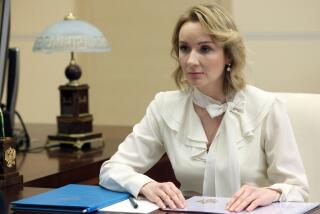Soviets Halt Press Conference as Refuseniks’ Families Protest : Answered Tough Questions About Human Rights
REYKJAVIK, Iceland — After fielding tough questions on their human rights policy, Soviet officials cut short a news conference today when relatives of Jewish refuseniks raised signs protesting the Kremlin’s emigration policies.
Despite the Icelandic government’s initial appeals to demonstrators to stay away, about 50 were in Reykjavik, and a propaganda struggle was evident between Soviet officials, trying to present a new face of Russia under the leadership of Mikhail S. Gorbachev, and Jewish campaigners trying to keep the spotlight on human rights abuses.
Six Soviet officials on a panel at Reykjavik’s Saga Hotel were telling Western journalists about economic reforms and the greater freedom of the media since Gorbachev became the Soviet leader last year.
They fielded some tough questions on human rights but abruptly ended the discussion when Jews in the audience held up signs urging the release from the Soviet Union of their relatives.
Igor Tufeld, who emigrated to Israel in 1977, asked whether his parents, Vladimir and Izolda Tufeld, could leave the Soviet Union in keeping with the 1975 Helsinki agreement calling for reuniting divided families.
‘A Case of Division’
Samuel Zivs, a Soviet attorney who fielded most of the human rights questions, replied: “I do not believe that your case is an example of a reunion. It is a case of division. When you left the Soviet Union, you left your parents and created the situation.”
The exchange was unusual because critics of Kremlin policy rarely get a chance to confront senior officials in the Soviet Union.
The Soviets curtailed the panel discussion after an hour, when Tufeld and other Jewish emigres brandished for TV cameras photographs of relatives unable to leave the Soviet Union.
Earlier the Soviet officials, wooing the world media, sketched an unusually frank picture of their country’s internal problems, talking of resistance, political prisoners and changes in emigration policy.
“A process of democratization and reform is now in progress,” political scientist Fyodor Burlatsky said. “But the resistance to this process is really quite serious.”
The main opposition came from officials who feared losing their power and privileges, he said. The publication of previously banned books and a “revolution” in the film union were examples of the new openness, he added.
No Distinction
Although the Kremlin has been pursuing a campaign for revival, words like democratization are rarely used to describe the process.
“We do not make a distinction between criminal and political prisoners in the Soviet Union,” said Zivs. It was highly unusual for a Soviet spokesman to implicitly acknowledge the existence of political detainees.
Zivs also said “changes are possible” in the restrictions to emigration, although he added that these would not be linked to the summit.
The spokesmen were at pains to avoid confrontation with the Jewish campaigners, who sat in on the news conference in the large Soviet press center in the Saga Hotel, Reykjavik’s best-appointed hotel.
More to Read
Sign up for Essential California
The most important California stories and recommendations in your inbox every morning.
You may occasionally receive promotional content from the Los Angeles Times.










